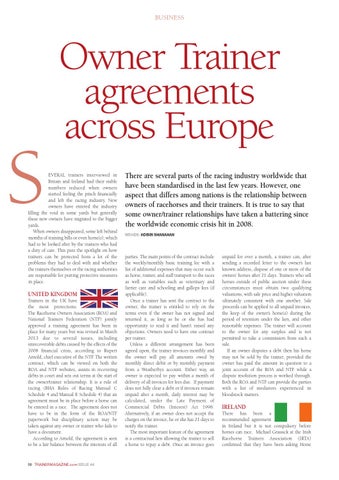VAT ISSUE 44_Jerkins feature.qxd 16/12/2013 13:04 Page 5
BUSINESS
S
Owner Trainer agreements across Europe
EVERAL trainers interviewed in Britain and Ireland had their stable numbers reduced when owners started feeling the pinch financially and left the racing industry. New owners have entered the industry filling the void in some yards but generally these new owners have migrated to the bigger yards. When owners disappeared, some left behind months of training bills or even horse(s), which had to be looked after by the trainers who had a duty of care. This puts the spotlight on how trainers can be protected from a lot of the problems they had to deal with and whether the trainers themselves or the racing authorities are responsible for putting protective measures in place.
UNITED KINGDOM Trainers in the UK have the most protections. The Racehorse Owners Association (ROA) and National Trainers Federation (NTF) jointly approved a training agreement has been in place for many years but was revised in March 2013 due to several issues, including unrecoverable debts caused by the effects of the 2008 financial crisis, according to Rupert Arnold, chief executive of the NTF. The written contract, which can be viewed on both the ROA and NTF websites, assists in recovering debts in court and sets out terms at the start of the owner/trainer relationship. It is a rule of racing (BHA Rules of Racing Manual C Schedule 4 and Manual E Schedule 4) that an agreement must be in place before a horse can be entered in a race. The agreement does not have to be in the form of the ROA/NTF paperwork but disciplinary action may be taken against any owner or trainer who fails to have a document. According to Arnold, the agreement is seen to be a fair balance between the interests of all
56 TRAINERMAGAZINE.com ISSUE 44
There are several parts of the racing industry worldwide that have been standardised in the last few years. However, one aspect that differs among nations is the relationship between owners of racehorses and their trainers. It is true to say that some owner/trainer relationships have taken a battering since the worldwide economic crisis hit in 2008. WORDS: ROISIN SHANAHAN
parties. The main points of the contract include the weekly/monthly basic training fee with a list of additional expenses that may occur such as horse, trainer, and staff transport to the races as well as variables such as veterinary and farrier care and schooling and gallops fees (if applicable). Once a trainer has sent the contract to the owner, the trainer is entitled to rely on the terms even if the owner has not signed and returned it, as long as he or she has had opportunity to read it and hasn’t raised any objections. Owners need to have one contract per trainer. Unless a different arrangement has been agreed upon, the trainer invoices monthly and the owner will pay all amounts owed by monthly direct debit or by monthly payment from a Weatherbys account. Either way, an owner is expected to pay within a month of delivery of all invoices for fees due. If payment does not fully clear a debt or if invoices remain unpaid after a month, daily interest may be calculated, under the Late Payment of Commercial Debts (Interest) Act 1998. Alternatively, if an owner does not accept the charges on the invoice, he or she has 21 days to notify the trainer. The most important feature of the agreement is a contractual lien allowing the trainer to sell a horse to repay a debt. Once an invoice goes
unpaid for over a month, a trainer can, after sending a recorded letter to the owner’s last known address, dispose of one or more of the owners’ horses after 21 days. Trainers who sell horses outside of public auction under these circumstances must obtain two qualifying valuations, with sale price and higher valuation ultimately consistent with one another. Sale proceeds can be applied to all unpaid invoices, the keep of the owner’s horse(s) during the period of retention under the lien, and other reasonable expenses. The trainer will account to the owner for any surplus and is not permitted to take a commission from such a sale. If an owner disputes a debt then his horse may not be sold by the trainer, provided the owner has paid the amount in question to a joint account of the ROA and NTF while a dispute resolution process is worked through. Both the ROA and NTF can provide the parties with a list of mediators experienced in bloodstock matters.
IRELAND There has been a recommended agreement in Ireland but it is not compulsory before horses can race. Michael Grassick at the Irish Racehorse Trainers Association (IRTA) confirmed that they have been asking Horse
